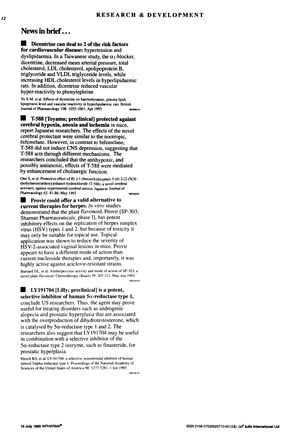News in Brief: Taiwanese Study on Dicentrine, Japanese Study on T-588, Provir's Effects on Herpes, and LY191704 as a 5α-Reductase Inhibitor
July 1993
in “
Inpharma Weekly
”

TLDR Dicentrine reduced heart disease risk factors in rats, T-588 protected mice brains without side effects, Provir blocked herpes virus and lessened mouse symptoms, and LY191704 could treat hair loss and prostate issues.
In a Taiwanese study published in April 1993, dicentrine, an α1-blocker, was found to decrease several risk factors for cardiovascular disease in hyperlipidaemic rats, including mean arterial pressure, total cholesterol, LDL cholesterol, apolipoprotein B, triglyceride, and VLDL triglyceride levels, while increasing HDL cholesterol levels and reducing vascular hyper-reactivity to phenylephrine. A Japanese study from May 1993 reported that T-588 protected against cerebral hypoxia, anoxia, and ischemia in mice without inducing CNS depression, suggesting it enhances cholinergic function. Provir, a plant flavonoid, demonstrated potent inhibitory effects on herpes simplex virus replication in vitro and reduced the severity of HSV-2-associated vaginal lesions in mice, indicating potential as a topical alternative to current herpes therapies, especially for aciclovir-resistant strains. Lastly, LY191704 was identified by US researchers as a potent, selective inhibitor of human 5α-reductase type 1, which may be useful for treating disorders like androgenic alopecia and prostatic hyperplasia, and could be combined with finasteride, a selective inhibitor of 5α-reductase type 2.




